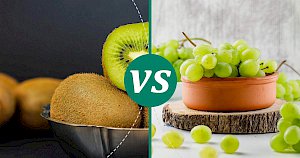Grapes vs Kiwi: Nutrition, Calories & Protein Compared


Grape vs Kiwi
Nutrition Facts
Serving size:
change
5g10g15g20g30g40g50g60g80g100g120g140g160g180g200g220g250g300g350g400g450g500g600g700g800g900g1000g
1oz2oz3oz4oz5oz6oz7oz8oz10oz12oz15oz20oz25oz30oz35oz40oz50oz
Amount Per Serving:
Serving size:
change
5g10g15g20g30g40g50g60g80g100g120g140g160g180g200g220g250g300g350g400g450g500g600g700g800g900g1000g
1oz2oz3oz4oz5oz6oz7oz8oz10oz12oz15oz20oz25oz30oz35oz40oz50oz
Amount Per Serving:
Grape vs Kiwi 100g Compare
| per 100g | Grapes | Kiwi |
|---|---|---|
| Calories | 67 | 61 |
| Carbohydrates | 17.15 g | 14.66 g |
| Fat | 0.35 g | 0.52 g |
| Dietary fiber | 0.9 g | 3 g |
| Protein | 0.63 g | 1 g |
| Calcium | 14 mg | 34 mg |
| Iron | 0.29 mg | 0.31 mg |
| Magnessium | 5 mg | 17 mg |
| Potassium | 191 mg | 312 mg |
| Sodium | 2 mg | 3 mg |
| Vitaminium A | 100 µg | 87 µg |
| Vitaminium B1 (Thiamine) | 0.092 mg | 0.027 mg |
| Vitaminium B2 (riboflavin) | 0.057 mg | 0.025 mg |
| Vitaminium B3 (Niacin) | 0.3 mg | 0.341 mg |
| Vitaminium B9 (Folic acid) | 0.004 mg | 25 mg |
| Vitaminium C | 4 mg | 92.7 mg |
| Vitaminium E | 0.19 mg | 1.46 mg |
| Vitaminium K | 0.015 µg | 40.3 µg |
| Beta karoten | 39 mg | 52 mg |
A Fresh Look at Grapes and Kiwi: A Nutritional Comparison
When it comes to choosing between grapes and kiwi, many of us are drawn to their distinct flavors and textures. But beyond their taste, these fruits offer unique nutritional profiles that are worth exploring. Whether you're reaching for a bunch of grapes or a kiwi, understanding their health benefits can help you make informed dietary choices. Let's dive into some fascinating facts about these fruits before comparing their nutritional values.
Delving into Grapes
Grapes, small yet mighty, have been savored for thousands of years, not only for their sweet and tart taste but also for their health benefits. They come in various colors, including green, red, and purple, each with its unique flavor profile and nutritional benefits. Grapes are well known for containing resveratrol, a powerful antioxidant that may help protect against heart disease, certain cancers, and other conditions. Beyond this, they're a hydrating snack, thanks to their high water content, making them a perfect, refreshing choice on a hot day.
Kiwi: A Nutritional Powerhouse
Kiwi, with its bright green flesh and tiny black seeds, offers a vibrant taste that's both sweet and tangy. But there's more to this fruit than meets the eye. Kiwi is renowned for its high vitamin C content, even surpassing that of oranges. This makes it an excellent choice for boosting the immune system. Additionally, kiwi contains actinidin, an enzyme that can aid in digestion by breaking down proteins more efficiently. It's also a great source of dietary fiber, which is beneficial for digestive health.
Comparing Grapes and Kiwi: A Nutritional Overview
When it comes to nutritional content, both grapes and kiwi offer a range of benefits, but they also have their differences. Here's a closer look at how they compare:
- Calories: Grapes have 69 calories per 100 grams, while kiwi has slightly fewer at 61 calories, making both fruits a low-calorie snack option.
- Carbohydrates and Fiber: Grapes contain 18 grams of carbohydrates and 0.9 grams of fiber, whereas kiwi offers 14.66 grams of carbohydrates and a higher fiber content of 3 grams, promoting better digestion and satiety.
- Fat and Protein: Both fruits are low in fat, but kiwi has a slightly higher content (0.52 grams) and also provides more protein (1 gram) compared to grapes (0.72 grams of protein).
- Vitamins and Minerals: Kiwi shines in its vitamin and mineral content, offering significantly more vitamin C, vitamin E, vitamin K, and potassium than grapes. It also provides more calcium, magnesium, and zinc, making it a nutrient-dense choice.
While grapes are a great source of antioxidants like resveratrol, kiwi offers digestive enzymes and a higher concentration of many essential vitamins and minerals. Both fruits are gluten-free and contain no cholesterol, making them heart-healthy options.
Choosing Between Grapes and Kiwi
Ultimately, the choice between grapes and kiwi comes down to personal preference and nutritional needs. If you're looking for a fruit that's high in antioxidants and easy to snack on throughout the day, grapes might be your go-to. On the other hand, if you're seeking a vitamin C boost with added digestive benefits, kiwi could be the better option. However, incorporating both into your diet can provide a wide range of nutrients and health benefits.
In conclusion, both grapes and kiwi are nutritious fruits that offer their unique set of benefits. By understanding their nutritional profiles, you can enjoy these fruits to their fullest, either as part of a balanced diet or as healthy snacks to fuel your day.
Grapes 100g
67kcalCalories source
- 92% CARBS.
- 3% PROTEIN
- 4% FAT
Kiwi 100g
61kcalCalories source
- 87% CARBS
- 6% PROTEIN
- 7% FAT
Compares of grape
- Grape vs Apple
- Grape vs Apricot
- Grape vs Avocado
- Grape vs Banana
- Grape vs Blackcurrants
- Grape vs Blueberries
- see all compares of grape
Marcin Piotrowicz
calories-info.com creator
Healthy diet and healthy lifestyle promoter
Add comment